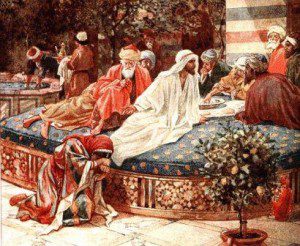Can I Be Open?
John 12:1-8
 For thousands of years nobody has quite known what to do with today’s gospel story. I’ve always thought of it as a biblical story with so many awkward scenes, even hearing it 2000 years later, it’s full of cringe-worthy moments.
For thousands of years nobody has quite known what to do with today’s gospel story. I’ve always thought of it as a biblical story with so many awkward scenes, even hearing it 2000 years later, it’s full of cringe-worthy moments.
It’s kind of like the story I’m about to tell you right now.
This is a story of my Uncle Al’s 80th birthday party. I was probably 8 years old, and as is the tradition in ethnic families like my own, his birthday called for a 9-course Chinese dinner for about 100 people downtown at a large restaurant in the heart of Honolulu’s Chinatown.
My siblings and I were antsy during the meal, per usual, bunching up the paper from our straws and holding contests over who could rig their chopsticks the best way for lobbing the paper balls the furthest.
My poor parents.
All of the sudden, sometime between about course 5 and course 6, a man dressed in a police uniform walked into the middle of the party. We stopped messing around when he did, because he was wearing aviator sunglasses (at night!) and carrying a big, fancy boom box (Some of you may not know what that is. If not, ask your parents. Or your kids.).
The police officer asked loudly who was celebrating, and when several people pointed in the direction of the middle of the room, he went straight to the table where my 80-year-old uncle was, decked out in leis as is the tradition for celebrations in my culture. The policeman set the boom box on the table, pressed PLAY on the cassette, and turned up the pulsing music until it was really loud. Then, he pulled out a chair, climbed up on the chair, and started dancing.
As you might imagine, by this time we kids were paying rapt attention. After a few minutes, as my poor uncle looked more and more confused, the police officer started taking his shirt off. My mother, horrified, leaned over and tried to cover our eyes, but—you’ll recall—there were several of us, so some of us watched as the rest of the scene unfolded.
My uncle continued in his confusion, my aunt sent looks like daggers in the direction of my father, as if to say: “Is this your idea of a joke?,” and the police officer relieved himself of his police uniform in a rather dramatic display, from what I can recall.
Turns out, as you may have guessed, the police officer was actually a stripper, hired not for the 9-course Chinese meal celebrating the 80th birthday of my Uncle Al…but for a bridal shower taking place in another room in the restaurant.
Awkward.
As I said when I started, at first glance there are, perhaps similarly, many awkward elements in today’s gospel story from John’s gospel, the story presenting us with this fifth Sunday of Lent question we’re invited to ask ourselves as we take on the challenge of yet another week of Lenten reflection.
You’re aware that this Lent, forty days from Ash Wednesday until Easter, we’ve been invited by the gospel texts to ask ourselves hard questions, that, if we ask with persistence and discipline, will result in an invitation to change: Can I resist temptation? Can I give up my life? Can I admit I’m wrong? Can I forgive?
Today our question is: Can I be open?
Can I live in this world with a heart that’s open; eyes wide and attentive; life inviting the engagement of others, so I can see God in places I might never think I would? Or will I choose instead to live with a closed, hard heart: unaware, unengaged, and perhaps even oppositional to all the new life that God is always in the process of creating?
This is the last Sunday before we follow Jesus into Jerusalem and into the last week of his life. Today we find ourselves in the dining room of Jesus’ friends Mary, Martha, and Lazarus. Recall that just a few days before, Jesus had raised Lazarus from the dead—he just called him out of the tomb and there he came, to everyone’s shock and amazement.
And, while this was great for Lazarus, for the leaders of the temple, that event immediately catapulted Jesus from annoying nuisance to plain out and out threat. Going around preaching a radical message is one thing, but raising people from the dead is a whole other thing altogether. To the temple authorities it was now GAME ON, and Jesus himself knew that the week ahead of him, Passover in Jerusalem, would be a dangerous and trouble-filled political game.
We might imagine that by the time Jesus made it back to Bethany for dinner that night, he was exhausted. Tired and travel weary, losing his voice, foot-sore from miles of tramping over the countryside, worn out from the needs and demands of the growing crowd of people who were looking to him to be their political savior. It was a good thing he and his disciples could find refuge in the home of dear friends Mary, Martha, and Lazarus. We all need that sometimes.
And so the passage tells us, Jesus came in, took a deep breath, and began to relax. His friends cooked dinner for him, and they were all gathered around the table—even Lazarus—catching up. There was so much to get caught up on.
Surely, among other things, they discussed the mounting tension surrounding them. They knew that no one could really predict what exactly was going to happen in the next week. Maybe Jesus shared with his close friends how he felt, that he was scared and unsure. Certainly, as they sat there together, friends around a table, they could see that Jesus needed them in some way to ease the weight of the burden he carried.
So after dinner, John tells us that Mary took a pound of costly perfume—really costly, like, that one jar cost a whole year’s wages—and set about anointing Jesus’ feet, washing them and smoothing the ointment over his rough and blistered skin. She took off her head covering, pulled down her hair, and used her hair to wipe his feet.
And there it was, a beautiful, awkward moment that perhaps made the mothers in the room reach over and try to cover their kids’ eyes…and you know, as one commentator points out, that the conversation as people walked home that night was not about the menu, shall we say.[1]
Let’s take a closer look.
We begin by noting that all four of the gospel accounts tell some iteration of this story, and though the details differ in each, we can assume that everybody is telling some version of the same events, unless of course Jesus was getting foot massages everywhere he went.
In some of the gospel accounts, this event takes place at Simon’s house, not Mary, Martha, and Lazarus’ house; the woman in the story is not named in two of the accounts; and in some versions the woman in the story perfumes Jesus’ feet and washes them, not just with her hair, but also with her tears.
And since it’s rare for any story to be included in all four of the gospel accounts, we readers should look long and hard here to see what is so important that everybody told their own version of this story.
Whoever the woman anointing Jesus’ feet was—and we’ll go with Mary today, since John’s version of the story tells us it was her—it was clear to everyone in the room that night that her behavior was unconventional. While it was common to wash the feet of your guests, as the roads around Galilee were dusty, this was always the utilitarian job of the servants.
A woman anointing a man’s feet with perfume was an act of intimacy and affection and honor—it would never have been done in the middle of a dinner party, of all places. To everyone there, this scene was awkward at best, and to some—we’ll soon see—it was downright threatening.
But don’t let the unusual nature of this event make you miss what’s really going on here. Mary takes a risk, shows love in a lavish and radical way, and her actions, while shocking to some, are not threatening or awkward to Jesus at all. In fact, Jesus comes to Mary’s defense; he compliments her for having the courage to do something so outside the box to show her love.
In Mary’s actions and Jesus’ words, we experience again a Jesus who will push us to the edge of convention and ask us to see the world in a whole new way.
Why?
Because Jesus honored Mary by recognizing the intent of her actions. He refused to diminish her by imposing moral judgment. He saw her as a full person and friend, not a just woman, a lesser part of the community. And in fact, Jesus actually elevates Mary here. He could see that her heart was open.
In the gospel of John, we’re told we can recognize Messiah by the act of anointing. And right here Jesus makes the most radical observation: the very first person to publicly recognize his divinity, to anoint Jesus as Messiah, is a woman. “She becomes the first preacher of the equalizing Reign of God and its justice.”[2]
Well. That’s awkward.
But everyone there who loved convention, who was along for the ride because they were sure Jesus was the next Justin Trudeau, was a little appalled, and some were downright offended. This was inappropriate. It was shocking and unacceptable. They disapproved. Their hearts were closed.
The spokesperson for convention that night was our friend Judas. Pulling himself up to his full height, look of outrage on his face, Judas, the disciple of Jesus who managed the group’s money, surveyed the scene before him in horror. He was so mad when he saw what was going on that he spoke up in outrage at what Mary had done—she’d just wasted a very valuable asset of the group’s—straight out mismanaged it! She didn’t even follow protocol to get approval! Not only could they have continued to save it to offset future expenses . . . but, he said not a little self-righteously, that the perfumed oil Mary had just used could have been sold and the proceeds of that sale been given to the poor, which, as we all know, is what a real follower of Jesus would have done.
Instead of looking for the wily work of God’s Spirit in the situation around him, Judas preferred to close his heart and use words he knew would breed worry in the crowd around him and would shut down this extravagant expression of love. Immediately.
Who was going to disagree? “Why, I’d like to know, was this not sold and the money given to the poor?” You can imagine the question hung in the air, tense silence.
Awkward.
In case we didn’t hear the hypocrisy in Judas’ voice, the writer of John’s gospel gives us a little insider information in verse 6—side commentary in parentheses. Judas didn’t object to Mary’s actions because he cared about the poor, John says. Judas objected because he was a betrayer and a thief. Mary’s lavish expression of love felt threatening to him.
We should take note of John’s language here, because, betrayal in the gospel of John means, “not believing.” Judas was a betrayer—he didn’t really believe in the message Jesus was preaching. And when John called Judas a thief, he used a word that’s only used one other time in John’s gospel, in John chapter 10, when Jesus is speaking of himself as the Good Shepherd, tending a sheepfold. Outside the walls of the sheepfold are thieves and bandits, Jesus said. Outsiders who are not really all in—not with their whole hearts—and they are there because they want to hurt.
It wasn’t the breaking open of the expensive perfume that had Judas up in arms, was it? It was that Mary acted out lavish, unrestrained love, the kind of love Jesus was about to act out himself as he went to his death to model love for the whole world.
And Judas had to object, because he knew, sitting there with a heart as closed and locked as a vault in a Swiss bank, that he—Judas—could never believe in God’s love enough to risk opening his heart and offering his life in such a vulnerable way.
And Judas was ashamed.
Awkward.
And then there’s Jesus, and how Jesus addresses what was called “waste” here. This Jesus, whom we’ve come to know as an ardent champion of the poor and disenfranchised at every possible opportunity, rebuffs the critical voices aimed at Mary and counters with words we’d never expect to hear coming out of his mouth. “Leave her alone. She bought it so that she might keep it for the day of my burial. You always have the poor with you, but you do not always have me.”
Savvy biblical scholars will note that Jesus is here making reference to another scripture passage, Deuteronomy 15:11, that reads, “Since there will never cease to be some in need on the earth, I therefore command you, ‘Open your hand to the poor and needy neighbor in your land.’”
Jesus isn’t saying: “Forget the poor—tonight it’s about me!” He’s calling out Judas and the other critics in the room when he sees their self-righteous judgment and hears words that “use the poor as a means to an end…co-opting the language of the least and the last” to diminish Mary and to squelch her expression of the gospel message of radical love.[3]
The poor will always be with you, which is exactly why you must live with open hearts and extravagant love, willing to give up everything to bring about the radical justice of the kingdom of God. To Jesus, Mary’s actions weren’t waste at all; they were lavish generosity, love, the risky action of an open heart, ready to participate in God’s love for the whole world. And her radical openness shined a bright and revealing light on the secretly closed and hard hearts of some of the others in the room.
Awkward.
Today I want to invite you to look hard at these two characters: Mary, heart open, relationship with Jesus deep and committed. And Judas, heart closed, no relationship at all to the radical love of God that Jesus came to teach us.
The contrast is stark and telling, and it invites us to ask a hard question:
Can I be open? Can I summon the courage to set aside my self-righteous certainty? Can I stop using my religion, or my social expectations, or my disapproval of something different, to try to limit the unrestrained love of God? Can I begin to see the wonder and reconciling work of God in places and people I’d never expect? Can I live with lavish welcome in this moment, this one, right here, because I believe with all my heart that God is at work?
If I can, if I can be open, I suspect I will begin to see things I’ve never seen before, to recognize the miraculous in what seemed mundane or even threatening, to risk more than I ever thought I could because I know…I know…that resurrection is the end of the story, and that love will ALWAYS have the final word.
Is your heart or your mind or your life closed?
Try in these next moments of silence to imagine taking out a key, unlocking the parts of yourself that have been closed tight, inaccessible, and finally—finally—cracking open the door. If you will take that risk, you will find, as Mary did, a great freedom in opening your life to the transforming love of God.
And we need to be open, because crucifixion is just ahead of us, and the only way—the only way—to get through the pain all the way to resurrection, is to open our hearts to the miraculous work of God in the world.
For all you Friday Night Lights fans, I’ll quote Coach Taylor: Church, we must go forward risking openness: “Clear eyes, full hearts, can’t lose!”
Can you be open?
[1] There are several wonderful exegetical discoveries in this sermon that I heard first in a conversation my friends over at Sermon Brainwave had this week. They’re brilliant! https://www.workingpreacher.org/brainwave.aspx?podcast_id=732
[2] Working Preacher commentary on John 12:1-8 by Eleseo Perez-Alvarez, Professor of Systematic Theology at the Lutheran Seminary Program of the Southwest, Puerto Rico.
[3] Ibid.












